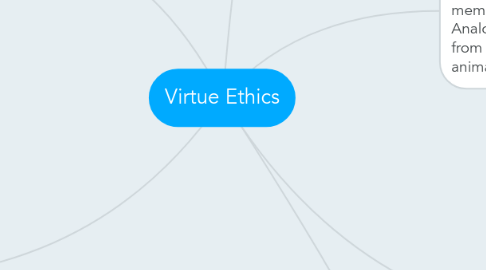Virtue Ethics
by Anna Bromely

1. Modern approaches to VE Focuses on questions of the good and not the right. Neglected question of what makes for right action. Must have a stance on this if is supposed alternative for consequentialism and deontology. Responses: Hursthouse (Qualified agent account), Slote (Admirable motive account), Swanton (Target centred VE conception of rightness) Consequentalism - promotes best consequences Deontology - Accordance with moral rule/principle VE - What a virtuous agent would characteristically do
2. 9 Objections to VT 1.Eudaimonia is a vague concept 2.Not trivially circular 3.Answers both Qs 'what should I do' and 'what kind of person should I be' 4.Relies on principles for these answers 5.Not reductionist in defining all our moral concepts 6.Does not find it any harder to argue against moral scepticism, pluralism, cultural relativism than the deontologist 7.Unresolvable conflict built into it - last 2 objections... 8.Against VT's use of the virtue and vice concepts enshrined in agents rules 9.Against use of concepts such as 'the worthwhile'
3. Implausible criteria of adequacy It is unrealistic to expect clear guidance in the difficult business of knowing what to do if one is to act well. The assumption that any good normative theory should provide answers to questions about real moral issues is unrealistic and implausible.
4. E.Anscomb: Virtue ethics was born out of 3 flaws in moral philosophy. 1.Lacks adequate moral psychology 2.Concepts of 'moral obligation' and 'moral ought' are survivals from earlier conception of ethics 3.Difference between various authors writing on ethics were insignificant
5. P.Foot: Virtues as character traits, but to know what character traits are virtues we must know what is human nature. To think of something as good is to think of it as member of a kind. Analogy of goodness is derived from goodness in plants and animals.
6. Ethical Naturalism - Ends given by nature as basis of evaluation. Include 3 key points and 1 for social beings. 1.Survival 2.Reproduction 3.Pleasure and freedom from pain 4.Good functioning of social group Virtues facilitate the ends specified by human nature. Virtues benefit their possessor (Plato) and make possessor a good human being. Ancient theories understand virtue to be a disposition to do the morally right thing (J.Annas). Virtues are dispositional, have an affective (feelings) and intellectual (reasoning) aspect The good for human beings lies in virtuous activity (Annas on Aristotle - Nichomachean Ethics Bk1). Aristotle stresses that we are by nature fit to receive the virtues. Nature shapes development from start but habituation actively guides it.


